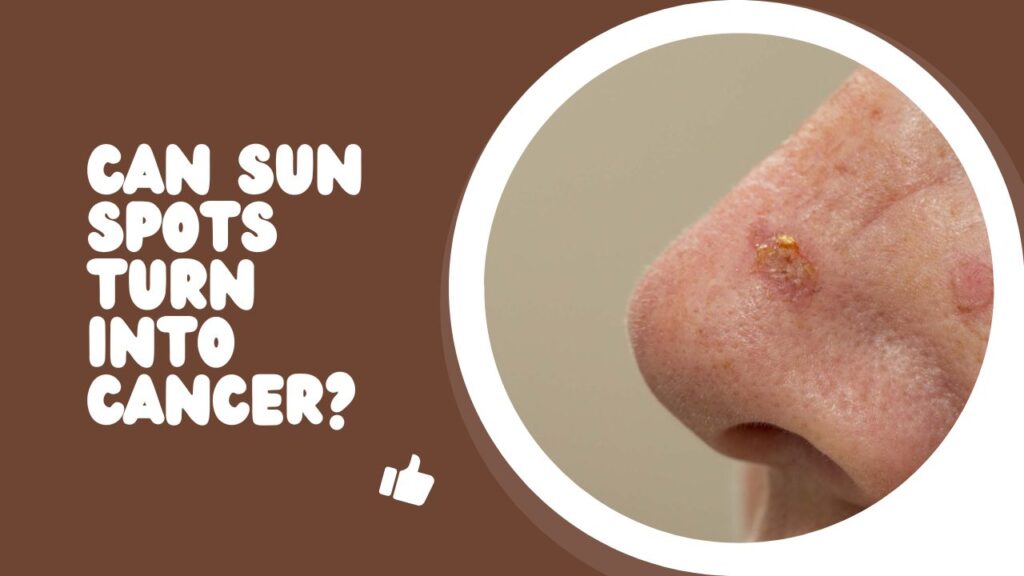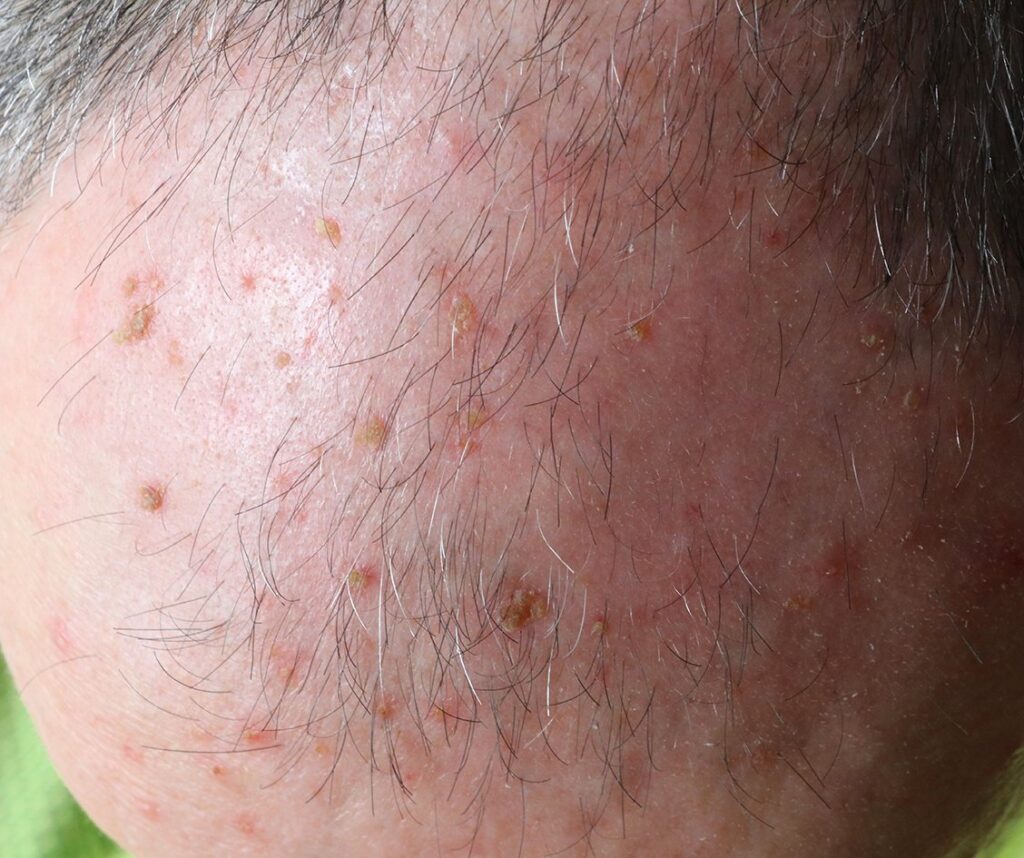
Can Sun Spots Turn Into Cancer? Sunspots can potentially develop into skin cancer in some cases, but it is not always a direct progression.
Sun spots, also known as solar lentigines or age spots, are harmless dark spots on the skin caused by excessive sun exposure.
All skin cancers, including melanoma, are more likely to occur with prolonged and frequent sun exposure.
It’s critical to shield your skin from the sun’s damaging rays and to keep an eye out for any changes in sunspots that could indicate skin cancer.
Skin cancer patients with early detection and treatment have a much higher likelihood of success. [Can Sun Spots Turn Into Cancer?]
Table of Contents
The Sun And Skin Health
Sun exposure can affect the health of our skin in both positive and bad ways. One of the most important things to take into account while analyzing the effects of sun exposure on our skin is UV radiation.
While some sun exposure is required for the synthesis of vitamin D, too much UV radiation exposure can cause skin cancer, premature aging, and sunburn.
It’s critical to realize that sunspots—also referred to as solar lentigines—and skin cancer are not the same thing. [Can Sun Spots Turn Into Cancer?]
Sunspots are dark patches of skin that are typically brought on by extended sun exposure. Sunspots can be ugly, but they are usually benign and do not lead to skin cancer.
But it’s vital to shield our skin from too much sun exposure and take the appropriate safety measures, like using sunscreen, finding shade during the hottest parts of the day, and dressing in protective gear.
Early detection of skin cancer also depends on routinely checking our skin for any changes, such as the appearance of new or altering moles.
According to research, 10% of individuals will experience at least one unusual mole in their lives, thus it is important to monitor any changes in our skin.
See Also: Itchy Skin At Night Hormone Imbalance And Menopause Itching
Sun Spots And Their Impact
Knowing the possible health hazards linked to sun spots is crucial while spending time in the sun.
Sun spots, sometimes called solar lentigines, are tiny, brown, flat patches that develop on skin after being exposed to ultraviolet (UV) radiation from the sun.
The pigment that gives skin its color, melanin, is produced in excess, which is the cause of these patches.
Sun spots can be distinguished by their appearance, which is that of tiny, round, or oval patches that are darker than the skin around them.
They frequently show up on the face, hands, and arms—areas of the body that are frequently exposed to the sun. [Can Sun Spots Turn Into Cancer?]
Sun spots don’t necessarily signal malignancy, but they can be a sign of prolonged sun exposure and a higher chance of skin cancer.
It is imperative that you seek shade, wear protective clothing, and use sunscreen with a high SPF to protect your skin from the sun.
It’s essential to routinely examine your skin for any changes, such as the appearance of new or shifting sun spots, in order to detect and treat skin cancer early on.
Seeking additional assessment and advice from a dermatologist is crucial if you discover any questionable areas.
See Also: How To Cure Melasma From The Inside – 10 Tips

Link Between Sun Spots And Cancer
Studies have discovered a connection between solar spots and the onset of cancer. Sun spots, sometimes called solar lentigines, are dark patches that develop on the skin as a result of UV radiation exposure. Studies show that over time, UV exposure can cause changes in skin cells, which may result in cancer.
It is thought that DNA damage to skin cells, which can lead to unchecked cell growth, is the process behind the development of cancer from sun spots. [Can Sun Spots Turn Into Cancer?]
Cancerous tumors may ultimately develop as a result of this. Therefore, it is essential to shield the skin from the sun and to keep an eye out for any changes in sun spots that can point to the possible development of cancer.
Protection And Prevention
Can sun spots turn into cancer? Preventive measures and protection are essential for maintaining the health of your skin.
Wearing protective clothes and applying sunscreen are two skin care techniques that can help lower the risk. High SPF (Sun Protection Factor) sunscreen protects your skin from damaging UV radiation.
Use a generous amount, and reapply after swimming or perspiring every two hours. Extra protection can also be obtained by using protective apparel, such as long-sleeved shirts, hats with wide brims, and sunglasses that block UV rays.
It’s crucial to keep in mind that sun spots can indicate UV damage even though they are not malignant in and of themselves. [Can Sun Spots Turn Into Cancer?]
It’s imperative to see a dermatologist for a comprehensive examination if you observe any changes in the size, shape, or color of your sun spots.
Sunscreen: Use a high SPF sunscreen and reapply every two hours or after swimming or sweating.
Protective Clothing: Wear long-sleeved shirts, wide-brimmed hats, and UV-blocking sunglasses.
See Also: Skin Discoloration On Legs: Causes, Types & Treatments

Early Detection And Treatment
It is essential to regularly examine oneself in order to spot any potential skin problems. Regularly examine your skin thoroughly to look for any changes or growths that might indicate the development of sun spots.
It is critical to get medical attention right away if you observe any anomalies. A dermatologist is qualified to provide an accurate diagnosis and recommend the best course of action for treatment.
Preventing the development of skin cancer requires early detection and treatment. Your doctor will be able to monitor any changes with regular check-ups and take the appropriate action to address them as soon as they occur.
Depending on the severity of the sun spot, excision, freezing, or laser therapy may be the available treatment options. Recall that prompt action is essential to reduce the likelihood that solar spots will develop into skin cancer.
See Also: Fish Oil for Eczema: See the Magic of Fish Oil
Holistic Wellness Approach
Sunspots and Cancer: Sun spots are not cancerous but can turn into skin cancer if not properly cared for. It is important to protect your skin from excessive sun exposure.
Holistic Wellness Approach: Taking a holistic approach to wellness involves considering all aspects of your health, including your diet, nutrition, and mind-body connection.
Diet and Nutrition: Consuming a balanced diet rich in antioxidants and essential nutrients can help support your skin’s health and reduce the risk of skin cancer. [Can Sun Spots Turn Into Cancer?]
Mind-Body Connection: Stress and mental well-being can impact the body’s ability to fight off cancerous cells. It’s vital to prioritize mental health as part of a holistic wellness plan.
Frequently Asked Questions On Can Sun Spots Turn Into Cancer?
How To Differentiate Sunspots From Cancer?
Sunspots are flat, and brown; cancer may be irregular, and changing. Consult a dermatologist for suspicious changes.
Are All Sunspots Dangerous?
Most sunspots are benign but signal sun damage and higher skin cancer risk. Monitor and take preventive measures. [Can Sun Spots Turn Into Cancer?]
Can I Prevent Sunspots?
Yes, use sunscreen, seek shade, and wear protective clothing to reduce sun exposure and prevent sunspots.
What If I Notice New Sunspots?
Consult a dermatologist for examination; early detection and sun protection help prevent skin cancer.
Conclusion
It is evident from learning about the advantages and disadvantages of sun exposure that avoiding sun spots is essential to lowering the risk of developing skin cancer.
People can prevent skin cancer by being aware of the ways in which solar spots may progress into the disease.
To preserve healthy skin, don’t forget to wear sunscreen, get shade, and get regular skin checks done.

Thanks I have recently been looking for info about this subject for a while and yours is the greatest I have discovered so far However what in regards to the bottom line Are you certain in regards to the supply
Stunning AI Tools: From text-to-image creation to voice-to-text conversion.
Simply desire to say your article is as surprising The clearness in your post is simply excellent and i could assume you are an expert on this subject Fine with your permission let me to grab your feed to keep up to date with forthcoming post Thanks a million and please carry on the gratifying work
I was suggested this web site by my cousin Im not sure whether this post is written by him as no one else know such detailed about my trouble You are incredible Thanks
Hi my loved one I wish to say that this post is amazing nice written and include approximately all vital infos Id like to peer more posts like this
You appear to be able to read my thoughts. It’s as though you authored the book on this subject or something. You seem to know so much about it. I think a few graphics could help to emphasise the point a little bit more, but other than that, this is a terrific blog, and I will surely be back.
While I typically refrain from reading blog articles, I must express my strong interest in this particular post and urge you to do so. Your writing style has truly impressed me. Thank you for sharing this wonderful article.
It seems like you are an authority on this subject—as if you wrote the book on it or something. Though I think you could clarify your arguments a bit more with some photos, other than that, this is a fantastic site and I will certainly be back.
upysm.com 是一個專業的社交媒體推廣平台,提供各種刷粉絲服務,讓您的Instagram、Facebook、Youtube等帳號快速增加人氣和影響力。無論您是個人創作者還是企業品牌,我們都可以為您量身定制最合適的方案,讓您在社交媒體上脫穎而出。
Twitter retweet satın almak için en uygun fiyatları burada bulabilirsiniz. Twitter retweet satın al adresinden detaylara göz atabilirsiniz.
Usually I do not read article on blogs however I would like to say that this writeup very compelled me to take a look at and do so Your writing taste has been amazed me Thanks quite nice post
Hi, good post. Your website appears to be having issues with Internet Explorer. You should look into this since many people will miss your great articles due of this problem, especially since IE is still the most widely used browser.